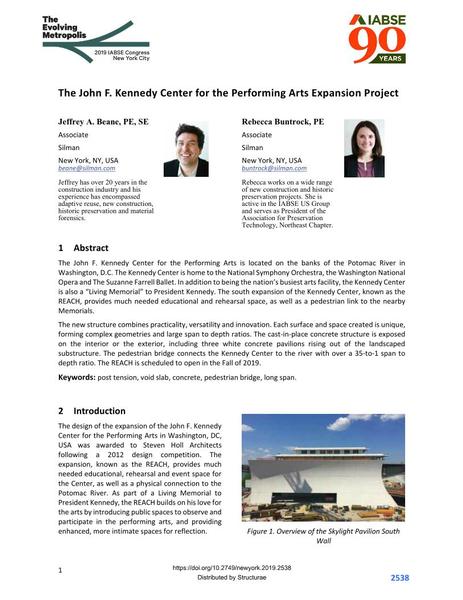The John F. Kennedy Center for the Performing Arts Expansion Project

|
|
|||||||||||
Bibliografische Angaben
| Autor(en): |
Jeffrey A. Beane
(Silman)
Rebecca Buntrock (Silman) |
||||
|---|---|---|---|---|---|
| Medium: | Tagungsbeitrag | ||||
| Sprache(n): | Englisch | ||||
| Tagung: | IABSE Congress: The Evolving Metropolis, New York, NY, USA, 4-6 September 2019 | ||||
| Veröffentlicht in: | The Evolving Metropolis | ||||
|
|||||
| Seite(n): | 2538-2541 | ||||
| Anzahl der Seiten (im PDF): | 4 | ||||
| DOI: | 10.2749/newyork.2019.2538 | ||||
| Abstrakt: |
The John F. Kennedy Center for the Performing Arts is located on the banks of the Potomac River in Washington, D.C. The Kennedy Center is home to the National Symphony Orchestra, the Washington National Opera and The Suzanne Farrell Ballet. In addition to being the nation's busiest arts facility, the Kennedy Center is also a "Living Memorial" to President Kennedy. The south expansion of the Kennedy Center, known as the REACH, provides much needed educational and rehearsal space, as well as a pedestrian link to the nearby Memorials. The new structure combines practicality, versatility and innovation. Each surface and space created is unique, forming complex geometries and large span to depth ratios. The cast-in-place concrete structure is exposed on the interior or the exterior, including three white concrete pavilions rising out of the landscaped substructure. The pedestrian bridge connects the Kennedy Center to the river with over a 35-to-1 span to depth ratio. The REACH is scheduled to open in the Fall of 2019. |
||||
| Stichwörter: |
Beton Fußgängerbrücke
|
||||
